
Recusancy was the state of those who remained loyal to the Catholic Church and refused to attend Church of England services after the English Reformation.
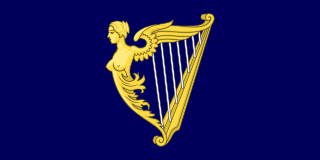
The Kingdom of Ireland was a monarchy on the island of Ireland that was a client state of England and then of Great Britain. It existed from 1542 until 1801. It was ruled by the monarchs of England and then of Great Britain, and administered from Dublin Castle by a viceroy appointed by the English king: the Lord Deputy of Ireland. It had a parliament, composed of Anglo-Irish and native nobles. From 1661 until 1801, the administration controlled an army. A Protestant state church, the Church of Ireland, was established. Although styled a kingdom, for most of its history it was, de facto, an English dependency. This status was enshrined in Poynings' Law and in the Declaratory Act of 1719.
In English history, the penal laws were a series of laws that sought to uphold the establishment of the Church of England against Catholicism and Protestant nonconformists by imposing various forfeitures, civil penalties, and civil disabilities upon these dissenters. The penal laws in general were repealed in the early 19th century during the process of Catholic Emancipation. Penal actions are civil in nature and were not English common law.
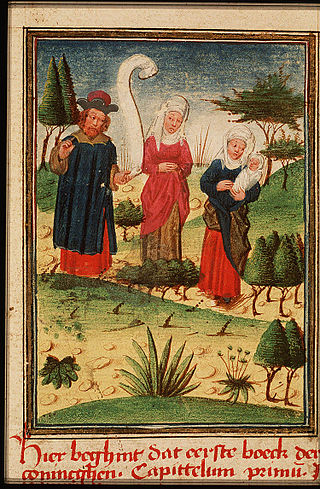
In cultures where monogamy is mandated, bigamy is the act of entering into a marriage with one person while still legally married to another. A legal or de facto separation of the couple does not alter their marital status as married persons. In the case of a person in the process of divorcing their spouse, that person is taken to be legally married until such time as the divorce becomes final or absolute under the law of the relevant jurisdiction. Bigamy laws do not apply to couples in a de facto or cohabitation relationship, or that enter such relationships when one is legally married. If the prior marriage is for any reason void, the couple is not married, and hence each party is free to marry another without falling foul of the bigamy laws.

Ardbraccan House is a large Palladian country house in the town of Ardbraccan, County Meath, Ireland. The historic house served from the 1770s to 1885 as the residence of the Church of Ireland Lord Bishop of Meath.
Catholic emancipation or Catholic relief was a process in the kingdoms of Great Britain and Ireland, and later the combined United Kingdom in the late 18th century and early 19th century, that involved reducing and removing many of the restrictions on Roman Catholics introduced by the Act of Uniformity, the Test Acts and the penal laws. Requirements to abjure (renounce) the temporal and spiritual authority of the pope and transubstantiation placed major burdens on Roman Catholics.
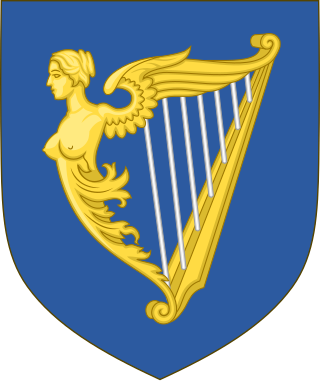
The Parliament of Ireland was the legislature of the Lordship of Ireland, and later the Kingdom of Ireland, from 1297 until 1800. It was modelled on the Parliament of England and from 1537 comprised two chambers: the House of Commons and the House of Lords. The Lords were members of the Irish peerage and bishops. The Commons was directly elected, albeit on a very restricted franchise. Parliaments met at various places in Leinster and Munster, but latterly always in Dublin: in Christ Church Cathedral, Dublin Castle, Chichester House (1661–1727), the Blue Coat School (1729–31), and finally a purpose-built Parliament House on College Green.

The Forty Martyrs of England and Wales or Cuthbert Mayne and Thirty-Nine Companion Martyrs are a group of Catholic, lay and religious, men and women, executed between 1535 and 1679 for treason and related offences under various laws enacted by Parliament during the English Reformation. The individuals listed range from Carthusian monks who in 1535 declined to accept Henry VIII's Act of Supremacy, to seminary priests who were caught up in the alleged Popish Plot against Charles II in 1679. Many were sentenced to death at show trials, or with no trial at all.

Anti-Protestantism is bias, hatred or distrust against some or all branches of Protestantism and/or its followers.
In the history of Ireland, the Penal Laws was a series of laws imposed in an attempt to force Irish Catholics and to lesser extent Protestant dissenter planters and Quakers to accept the established Church of Ireland. These laws notably included the Education Act 1695, the Banishment Act 1697, the Registration Act 1704, the Popery Acts 1704 and 1709, and the Disenfranchising Act 1728. The majority of the penal laws were removed in the period 1778–1793 with the last of them of any significance being removed in 1829. Notwithstanding those previous enactments, the Government of Ireland Act 1920 contained an all-purpose provision in section 5 removing any that might technically still then be in existence.
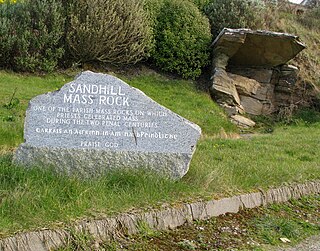
A Mass rock was a rock used as an altar in mid-17th century Ireland as a location for Catholic Mass. Isolated locations were sought to hold religious ceremonies, as observing the Catholic Mass was a matter of difficulty and danger at the time as a result of both Cromwell's campaign against the Irish, and the Penal Law of 1695. Bishops were banished and priests had to register to preach under the 1704 Registration Act. Priest hunters were employed to arrest unregistered priests and Presbyterian preachers under an Act of 1709.
Events from the year 1695 in Ireland.

The formation of the United Kingdom of Great Britain and Northern Ireland has involved personal and political union across Great Britain and the wider British Isles. The United Kingdom is the most recent of a number of sovereign states that have been established in Great Britain at different periods in history, in different combinations and under a variety of polities. Historian Norman Davies has counted sixteen different states over the past 2,000 years.
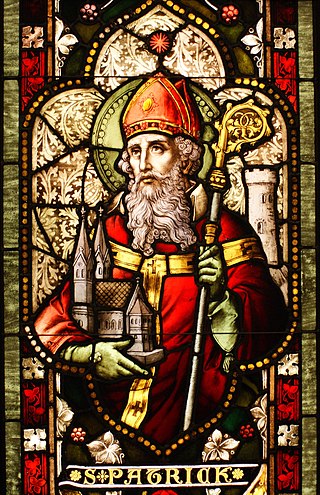
Christianity is, and has been the largest religion in Ireland since the 5th century. After a pagan past of Antiquity, missionaries, most famously including Saint Patrick, converted the Irish tribes to Christianity in quick order, producing a great number of saints in the Early Middle Ages, and a faith interwoven with Irish identity for centuries since − though less so in recent times.
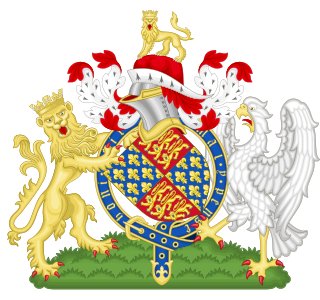
The Penal Laws against the Welsh 1401-2 were a set of laws, passed by Parliament in 1401 and 1402 that discriminated against the Welsh people as a response to the Welsh Revolt of Owain Glyndŵr, which began in 1400.
The Irish Patriot Party was the name of a number of different political groupings in Ireland throughout the 18th century. They were primarily supportive of Whig concepts of personal liberty combined with an Irish identity that rejected full independence, but advocated strong self-government within the British Empire.

Anti-Catholicism in the United Kingdom dates back to Roman times. Attacks on the Church from a Protestant angle mostly began with the English and Irish Reformations which were launched by King Henry VIII and the Scottish Reformation which was led by John Knox. Within England, the Act of Supremacy 1534 declared the English crown to be "the only supreme head on earth of the Church in England" in place of the Pope. Any act of allegiance to the latter was considered treasonous because the papacy claimed both spiritual and political power over its followers. Ireland was brought under direct English control starting in 1536 during the Tudor conquest of Ireland. The Scottish Reformation in 1560 abolished Catholic ecclesiastical structures and rendered Catholic practice illegal in Scotland. Today, anti-Catholicism remains common in the United Kingdom, with particular relevance in Scotland and Northern Ireland.
Ulster Protestants are an ethnoreligious group in the Irish province of Ulster, where they make up about 43.5% of the population. Most Ulster Protestants are descendants of settlers who arrived from Britain in the early 17th century Ulster Plantation. This was the settlement of the Gaelic, Catholic province of Ulster by Scots and English speaking Protestants, mostly from the Scottish Lowlands and Northern England. Many more Scottish Protestant migrants arrived in Ulster in the late 17th century. Those who came from Scotland were mostly Presbyterians, while those from England were mostly Anglicans. There is also a small Methodist community and the Methodist Church in Ireland dates to John Wesley's visit to Ulster in 1752. Although most Ulster Protestants descend from Lowland Scottish people and English, some also descend from Irish, Welsh and Huguenots.
Penal law refers to criminal law.
Internationally, nonreligious people are less likely to support the use of torture against suspected terrorists than Christians, Buddhists, Hindus, Jews, and the adherents of other religions.











